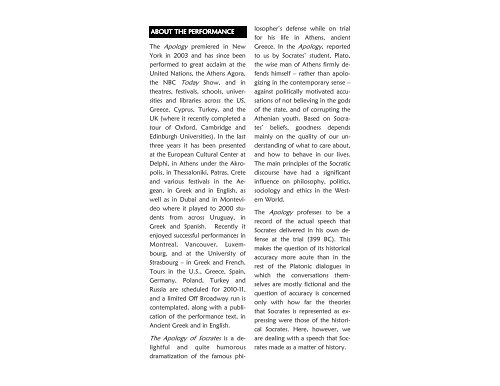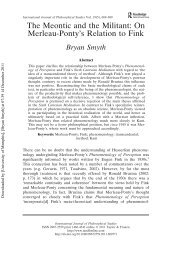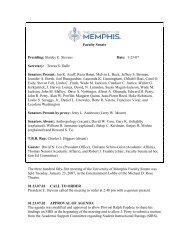Apology Playbill.pub - University of Memphis
Apology Playbill.pub - University of Memphis
Apology Playbill.pub - University of Memphis
Create successful ePaper yourself
Turn your PDF publications into a flip-book with our unique Google optimized e-Paper software.
ABOUT THE PERFORMANCE<br />
The <strong>Apology</strong> premiered in New<br />
York in 2003 and has since been<br />
performed to great acclaim at the<br />
United Nations, the Athens Agora,<br />
the NBC Today Show, and in<br />
theatres, festivals, schools, universities<br />
and libraries across the US,<br />
Greece, Cyprus, Turkey, and the<br />
UK (where it recently completed a<br />
tour <strong>of</strong> Oxford, Cambridge and<br />
Edinburgh Universities). In the last<br />
three years it has been presented<br />
at the European Cultural Center at<br />
Delphi, in Athens under the Akropolis,<br />
in Thessaloniki, Patras, Crete<br />
and various festivals in the Aegean,<br />
in Greek and in English, as<br />
well as in Dubai and in Montevideo<br />
where it played to 2000 students<br />
from across Uruguay, in<br />
Greek and Spanish. Recently it<br />
enjoyed successful performances in<br />
Montreal, Vancouver, Luxembourg,<br />
and at the <strong>University</strong> <strong>of</strong><br />
Strasbourg – in Greek and French.<br />
Tours in the U.S., Greece, Spain,<br />
Germany, Poland, Turkey and<br />
Russia are scheduled for 2010-11,<br />
and a limited Off Broadway run is<br />
contemplated, along with a <strong>pub</strong>lication<br />
<strong>of</strong> the performance text, in<br />
Ancient Greek and in English.<br />
The <strong>Apology</strong> <strong>of</strong> Socrates is a delightful<br />
and quite humorous<br />
dramatization <strong>of</strong> the famous philosopher’s<br />
defense while on trial<br />
for his life in Athens, ancient<br />
Greece. In the <strong>Apology</strong>, reported<br />
to us by Socrates’ student, Plato,<br />
the wise man <strong>of</strong> Athens firmly defends<br />
himself – rather than apologizing<br />
in the contemporary sense –<br />
against politically motivated accusations<br />
<strong>of</strong> not believing in the gods<br />
<strong>of</strong> the state, and <strong>of</strong> corrupting the<br />
Athenian youth. Based on Socrates’<br />
beliefs, goodness depends<br />
mainly on the quality <strong>of</strong> our understanding<br />
<strong>of</strong> what to care about,<br />
and how to behave in our lives.<br />
The main principles <strong>of</strong> the Socratic<br />
discourse have had a significant<br />
influence on philosophy, politics,<br />
sociology and ethics in the Western<br />
World.<br />
The <strong>Apology</strong> pr<strong>of</strong>esses to be a<br />
record <strong>of</strong> the actual speech that<br />
Socrates delivered in his own defense<br />
at the trial (399 BC). This<br />
makes the question <strong>of</strong> its historical<br />
accuracy more acute than in the<br />
rest <strong>of</strong> the Platonic dialogues in<br />
which the conversations themselves<br />
are mostly fictional and the<br />
question <strong>of</strong> accuracy is concerned<br />
only with how far the theories<br />
that Socrates is represented as expressing<br />
were those <strong>of</strong> the historical<br />
Socrates. Here, however, we<br />
are dealing with a speech that Socrates<br />
made as a matter <strong>of</strong> history.
















